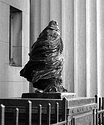Jacob Iverson
Subscriber
Hi all,
First time poster, long time (accountless) lurker.
While I've seen a few vision-related threads here, I was curious if there are members who only have central vision in one eye (like myself – in my right) and how they feel that impacts their work.
Personally, I was born this way, so I have no conception of what normal depth perception is. Retinal scar via sickness during pregnancy.
I am familiar with a few totally blind photographers, like Kurt Weston – Does anyone know any who work (or spent awhile working) with monocular vision?
I vastly prefer SLR viewing for my work, and consider the viewfinder as just a reduction of my normal vision. Perhaps, for me, that's the satisfying element. Does anyone relate?
First time poster, long time (accountless) lurker.
While I've seen a few vision-related threads here, I was curious if there are members who only have central vision in one eye (like myself – in my right) and how they feel that impacts their work.
Personally, I was born this way, so I have no conception of what normal depth perception is. Retinal scar via sickness during pregnancy.
I am familiar with a few totally blind photographers, like Kurt Weston – Does anyone know any who work (or spent awhile working) with monocular vision?
I vastly prefer SLR viewing for my work, and consider the viewfinder as just a reduction of my normal vision. Perhaps, for me, that's the satisfying element. Does anyone relate?






